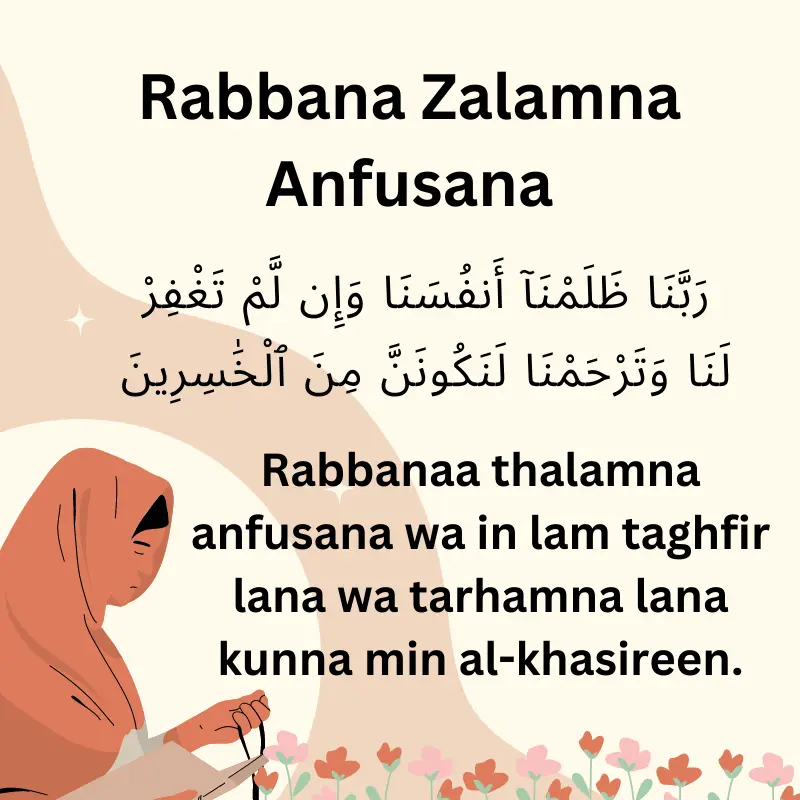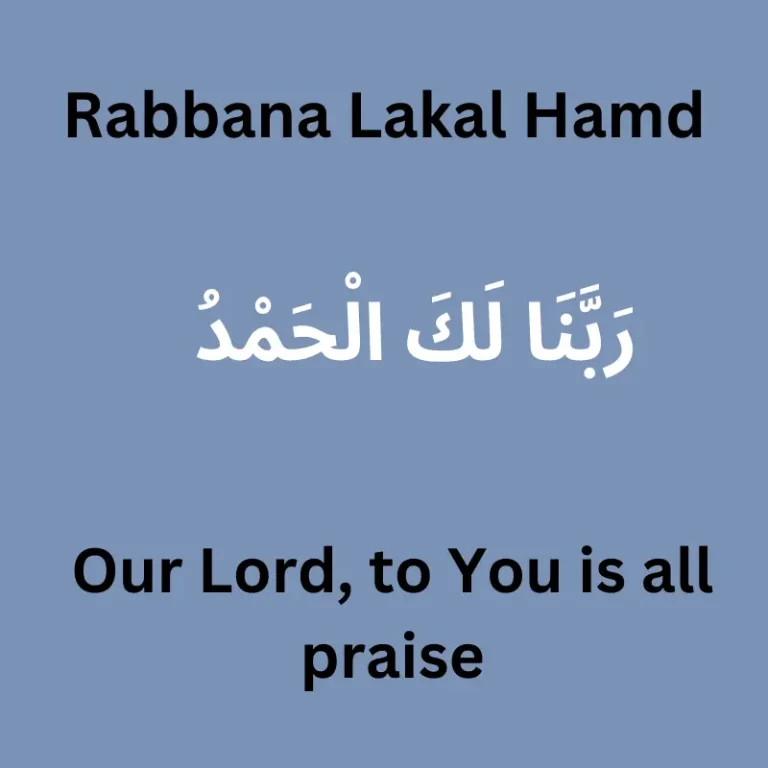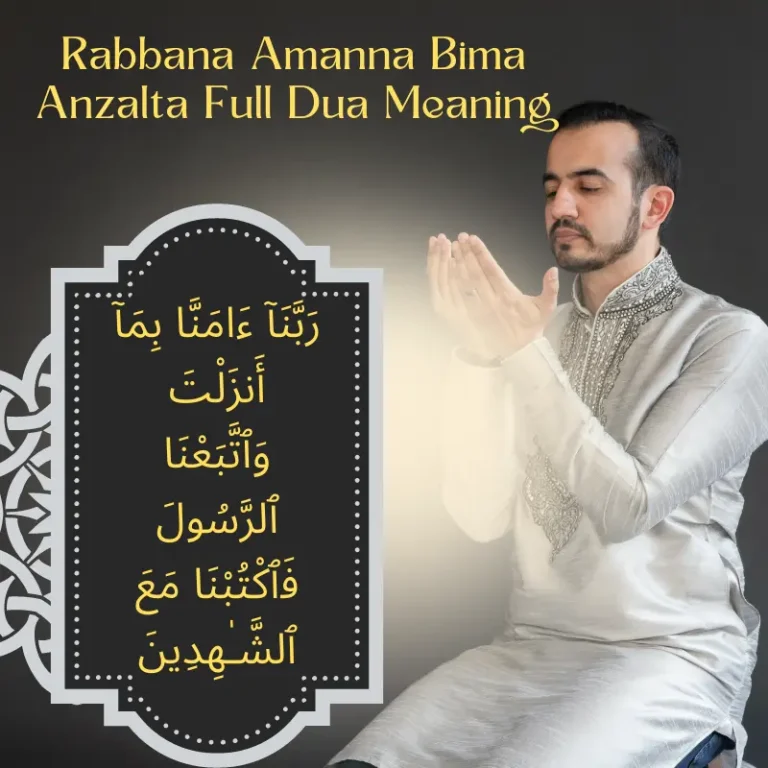Rabbana Zalamna Anfusana Full Dua Meaning
In the realm of Islamic supplications, the “Rabbana Zalamna Anfusana” Dua holds a significant place. This heartfelt prayer, which translates to “Our Lord, we have wronged ourselves,” encapsulates a profound acknowledgment of human fallibility and a sincere plea for Allah’s forgiveness and mercy. In this article, we will delve into the depths of this powerful dua, its meanings, context, and the spiritual significance it holds for Muslims worldwide.
Rabbana Zalamna Anfusana Dua In Arabic
رَبَّنَا ظَلَمْنَآ أَنفُسَنَا وَإِن لَّمْ تَغْفِرْ لَنَا وَتَرْحَمْنَا لَنَكُونَنَّ مِنَ ٱلْخَٰسِرِينَ
Rabbana Zalamna Anfusana Dua In English
“Rabbanaa thalamna anfusana wa in lam taghfir lana wa tarhamna lana kunna min al-khasireen.”
Translate:
“Our Lord, we have wronged ourselves, and if You do not forgive us and have mercy upon us, we will surely be among the losers.”
Pronunciation
Rabbana Zalamna Anfusana Dua Benefits
The benefits of reciting this dua include:
- Seeking Forgiveness: Acknowledging mistakes and asking Allah for pardon.
- Humility and Reflection: Reminding of human fallibility, promoting humility and self-reflection.
- Emotional Relief: Easing guilt and finding solace in Allah’s compassion.
- Strengthening Relationship: Deepening connection with Allah through repentance.
- Inspiration from Prophets: Learning from Prophet Adam’s sincere repentance.
- Renewed Intentions: Committing to self-improvement and divine guidance.
- Spiritual Cleansing: Purifying the soul, releasing negative emotions.
- Building Patience: Cultivating patience to overcome shortcomings.
- Protection from Arrogance: Guarding against pride, fostering humility.
- Inner Peace: Attaining tranquility through repentance and reliance on Allah’s mercy.
Understanding the Essence of the “Rabbana Zalam na An fusana”
The Humble Admission of Wrongdoing
At the heart of this supplication lies the recognition of human imperfection. The dua begins with a powerful declaration, acknowledging that individuals often wrong themselves. This serves as a reminder of the inherent vulnerability of human nature and the propensity to make mistakes.
Seeking Divine Forgiveness
As the dua continues, it transforms into a fervent request for Allah’s forgiveness. The phrase “fa’ghfir lana” translates to “so forgive us.” This part of the dua underscores the profound concept of divine mercy in Islam, emphasizing that Allah’s forgiveness is boundless and available to those who sincerely seek it.
Contextualizing the Dua
A Lesson from the Prophets
The Quran often recounts stories of prophets who turned to Allah with humility, seeking forgiveness for their actions. The “Rabbana Zalam na An fusana” dua echoes the humility displayed by these spiritual exemplars, illustrating that even the most righteous individuals recognize their need for Allah’s mercy.
Reflection in Times of Adversity
The dua holds special significance during moments of difficulty or hardship. Muslims often turn to this supplication as a means of introspection during challenges, recognizing that adversity can be a result of their own actions. This reflection cultivates a sense of responsibility and a renewed commitment to seeking Allah’s guidance.
The Spiritual Connection
A Channel for Repentance
The “Rabbana Zalamna Anfusana” dua serves as a potent conduit for repentance. It enables believers to express remorse for their mistakes and transgressions while reestablishing their connection with Allah. This process of self-awareness and repentance is integral to the spiritual journey in Islam.
Strengthening the Bond with Allah
Through this supplication, Muslims strengthen their relationship with Allah. By acknowledging their shortcomings and seeking forgiveness, believers engage in an intimate conversation with the Divine. This act of reaching out fosters a sense of closeness and reliance on Allah’s guidance.
Incorporating the Dua into Daily Life
Reflection in Personal Prayers
Individuals often incorporate the “Rabbana Zalamna Anfusana” dua into their daily prayers. It serves as a moment of self-reflection, allowing Muslims to assess their actions and seek Allah’s mercy regularly.
Guiding Interactions with Others
The dua’s underlying humility and focus on seeking forgiveness also influence how Muslims interact with others. It encourages compassion, empathy, and a willingness to admit one’s mistakes and make amends in human relationships.






